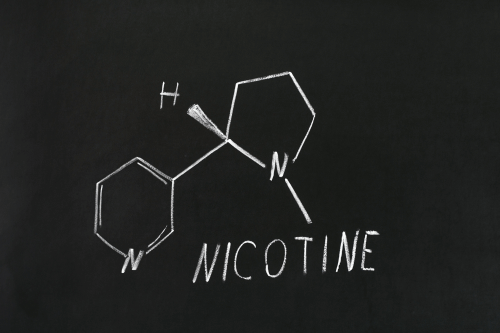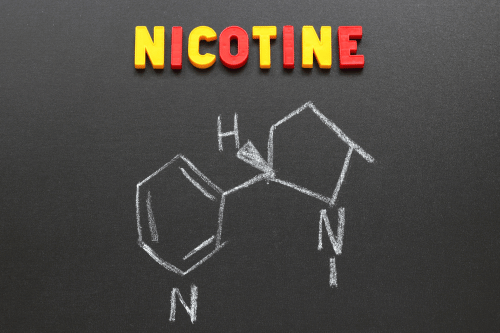

Nicotine, a chemical compound predominantly found in tobacco plants, has been a topic of intense debate. Some researchers discuss its neuroprotective effects, weighing them against the risks and benefits of nicotine use. While some argue for its cognitive-enhancing properties, others highlight its addictive nature and potential harm. This article explores the question: Is nicotine good for your brain? and examines its effects on mental health, cognitive function, and overall well-being.

Nicotine is a highly addictive substance found in tobacco products, including cigarettes, cigars, and e-cigarettes. It is a naturally occurring chemical compound extracted from the tobacco plant or synthesized in laboratories. As the primary psychoactive ingredient in tobacco, nicotine is responsible for the addictive properties and the various effects it has on the brain. When people smoke cigarettes or use other tobacco products, nicotine is rapidly absorbed into the bloodstream, reaching the brain within seconds and triggering a cascade of neurochemical reactions.
Nicotine interacts with nicotinic acetylcholine receptors in the brain, stimulating the release of neurotransmitters like dopamine, which influences mood and attention. This neurotransmitter release creates both short-term cognitive effects and long-term risks. While some studies suggest that nicotine may enhance focus and memory temporarily, the long-term effects of nicotine use, particularly through cigarette smoking or e-cigarettes, often outweigh these benefits by significantly harming the brain’s structure and functionality over time.
Nicotine’s impact on the human brain is multi-faceted. In addition to stimulating dopamine release, it affects areas like the prefrontal cortex, responsible for decision-making and impulse control. Repeated exposure to nicotine alters neural pathways, leading to dependency and often exacerbating mental health issues like anxiety and depression. Moreover, the interaction between nicotine and the central nervous system underpins its addictive potential.
Research highlights a complex relationship between nicotine and cognitive function, where short-term gains are often overshadowed by long-term consequences:
Positive Effects:
Nicotine may temporarily improve attention and working memory, particularly in individuals experiencing cognitive impairment, contributing to cognitive enhancement.
It has been studied as a treatment for conditions like Alzheimer’s disease and attention deficit hyperactivity disorder (ADHD), with mixed results.
Some studies suggest nicotine might enhance synaptic plasticity, which is crucial for learning and memory formation.
Negative Effects:
Prolonged nicotine exposure can lead to cognitive deficits and impair brain development, particularly in young adults, whose brains are still maturing.
Nicotine addiction and dependence contribute to a host of mental health challenges, such as increased anxiety and depression symptoms, which can worsen over time.
Chronic nicotine use has been linked to memory impairment and reduced adaptability in problem-solving tasks.
Nicotine works by binding to nicotinic acetylcholine receptors (nAChRs) in the brain, which play a crucial role in regulating various cognitive functions such as attention, learning, and memory. When nicotine binds to these receptors, it triggers the release of dopamine, a neurotransmitter associated with pleasure and reward. This release of dopamine reinforces the behavior of smoking, making it highly addictive. The interaction between nicotine and nAChRs is a key factor in understanding both the short-term cognitive enhancements and the long-term risks associated with nicotine use.
Acetylcholine (Ach) is a neurotransmitter that is essential for the regulation of cognitive functions like attention, learning, and memory. Nicotinic acetylcholine receptors (nAChRs) are a specific subtype of Ach receptors that are activated by nicotine. When nicotine binds to these receptors, it not only triggers the release of dopamine but also other neurotransmitters, contributing to its addictive properties. The activation of nAChRs by nicotine can temporarily enhance cognitive functions, but repeated exposure leads to changes in brain chemistry that can result in dependency and cognitive deficits over time.
Dopamine is a key neurotransmitter involved in the regulation of reward, motivation, and pleasure. The release of dopamine in response to nicotine binding to nAChRs is a critical component of nicotine addiction. This dopamine release creates a pleasurable sensation, reinforcing the behavior of smoking and making it difficult to quit. Other neurotransmitters, such as serotonin and GABA, also play roles in regulating nicotine’s effects on the brain. The complex interplay between these chemicals contributes to the addictive nature of nicotine and its impact on mental health.
While nicotine might provide short-term relief for some anxiety and depression symptoms, its long-term effects on mental health are largely detrimental. The negative impact on the human brain includes alterations in brain circuits responsible for impulse control and emotional stability, contributing to neuropsychiatric disorders and exacerbating existing mental health issues.
Nicotine’s role in mental health is paradoxical. For some, it serves as a temporary coping mechanism, offering relief from stress and depressive symptoms. However, the underlying mechanisms of nicotine dependency often trap users in a cycle of craving and withdrawal, which can intensify mental health struggles over time.
Nicotine use is strongly linked to various psychiatric disorders, including depression and anxiety. Some individuals turn to nicotine as a form of self-medication, hoping to alleviate their symptoms. However, the underlying mechanisms of nicotine’s interaction with these disorders often result in worsening conditions over time, creating a vicious cycle of dependency and declining mental health. Moreover, nicotine’s impact on neurotransmitter balance and the resulting neurochemical changes can complicate the treatment of co-occurring conditions like ADHD and bipolar disorder.
Nicotine is widely regarded as a highly addictive substance, making it difficult for individuals to quit smoking or using other nicotine products. This addiction stems from its ability to deliver rapid bursts of dopamine through reward pathways, which reinforce nicotine cravings. Withdrawal symptoms, including irritability, mood swings, and difficulty concentrating, further complicate efforts to quit.
For those looking to break free from nicotine dependence, nicotine replacement therapies such as nicotine patches, gums, and lozenges can provide significant help. These treatments work by gradually reducing nicotine cravings and mitigating withdrawal symptoms, offering a pathway to successful smoking cessation and improved overall mental health.
Advancements in nicotine replacement options now include nicotine gums, inhalers, and even digital support programs. These approaches aim to address both the physical and psychological aspects of addiction, empowering individuals to regain control over their lives.
The long-term effects of nicotine on the central nervous system and brain development present serious concerns for both mental and physical health:
Adverse Effects:
Chronic use of nicotine can result in memory impairment and diminished synaptic plasticity, critical for learning and adaptability.
High nicotine levels are linked to cognitive impairment caused by structural and functional changes in essential brain regions, including the prefrontal cortex.
Persistent nicotine use often leads to difficulty concentrating and long-term reductions in mental acuity.
Neurodegenerative Risks:
Prolonged exposure to nicotine is associated with an increased risk of Alzheimer’s disease-like pathogenesis and other neurodegenerative diseases, potentially accelerating cognitive decline in later years.
Nicotine’s interaction with neural inflammation has been implicated in the progression of Parkinson’s disease and related conditions.
The primary mode of nicotine consumption is through smoking cigarettes and other tobacco products. These methods introduce additional harmful chemicals into the body, amplifying the risks to both physical and mental health. Regular use of e-cigarettes also poses significant risks, especially for young adults, whose developing brains are more susceptible to nicotine’s harmful effects.
Moreover, the rise of e-cigarettes and vaping has shifted public perceptions of nicotine, often masking its addictive and harmful nature. Many users believe these alternatives are safer, but evidence increasingly suggests they carry significant risks for brain health and overall well-being.
Efforts to achieve smoking cessation are essential for reducing the myriad health risks associated with nicotine. Beyond physical health benefits, quitting nicotine often results in profound improvements in mental clarity, emotional stability, and overall cognitive functions. Support programs and medical interventions can play a critical role in this journey.
Behavioral therapies, combined with medical treatments, offer a comprehensive approach to addressing nicotine addiction. By understanding the emotional triggers and psychological patterns driving addiction, individuals can develop healthier coping mechanisms and achieve lasting recovery.
Quitting nicotine can be a challenging endeavor due to its highly addictive properties. Nicotine withdrawal symptoms, including anxiety and depression, often occur when an individual attempts to quit smoking. These symptoms can make the quitting process difficult, but there are effective strategies to help. Nicotine replacement therapy (NRT), such as nicotine patches, gums, and lozenges, can alleviate withdrawal symptoms and increase the chances of successful quitting. Medications like bupropion and varenicline are also available to support the quitting process. Additionally, cognitive-behavioral therapy (CBT) and other forms of counseling provide essential support and guidance, helping individuals develop healthier coping mechanisms and achieve long-term success in quitting nicotine.
Emerging research examines acute nicotine treatment for its potential to improve cognitive impairment in specific medical scenarios. For example, controlled doses of nicotine are being studied for their effects on conditions such as Alzheimer’s disease and ADHD. However, the substance’s status as a highly addictive substance raises ethical and medical concerns, limiting its broader application.
Ongoing clinical trials and behavioral and electrophysiological studies continue to investigate nicotine’s effects on the brain. These efforts aim to uncover its potential therapeutic uses while minimizing risks. Striking a balance between positive reinforcement and mitigating adverse effects will be crucial for future applications.
Innovative studies now focus on understanding how nicotine interacts with other substances and its role in neuroplasticity. These findings may pave the way for targeted therapies that leverage nicotine’s potential benefits without triggering dependency.
While nicotine may offer temporary cognitive boosts and relief from certain mental health symptoms, the health effects of prolonged use, including addiction, cognitive deficits, and risks to mental health, far outweigh its potential benefits. Its role as a highly addictive substance poses significant challenges to both individual well-being and public health.
For individuals struggling with nicotine addiction, seeking professional support is essential. Interventions such as nicotine replacement therapy, counseling, and comprehensive recovery programs can help break the cycle of addiction and pave the way for long-term health and wellness.
At Sullivan Recovery, we recognize the profound challenges associated with nicotine addiction. Our tailored treatment programs address the physical, emotional, and psychological aspects of nicotine dependence, offering a holistic approach to recovery.
If you or someone you know is battling nicotine addiction, contact Sullivan Recovery today. Our team of experts is dedicated to providing evidence-based treatments and compassionate care, empowering individuals to reclaim their lives and achieve sustainable recovery.

At Sullivan Recovery, as an in-network provider we work with most insurance plans, such as:
And More
If you or a loved one are struggling with mental health challenges or substance abuse, reach out to Sullivan Recovery today. Our team of compassionate professionals is here to support your journey towards lasting well-being. Give us a call at 949-836-7180.
Nicotine can temporarily improve attention and working memory by stimulating dopamine release and interacting with nicotinic acetylcholine receptors in the brain.
While nicotine may provide short-term relief for anxiety and depression symptoms, its long-term effects often worsen mental health due to dependency and withdrawal symptoms.
No, nicotine poses significant risks to developing brains, particularly in young adults, leading to cognitive deficits and potential mental health challenges.
Nicotine replacement therapies, counseling, and support programs can help individuals manage cravings, mitigate withdrawal symptoms, and achieve long-term recovery.